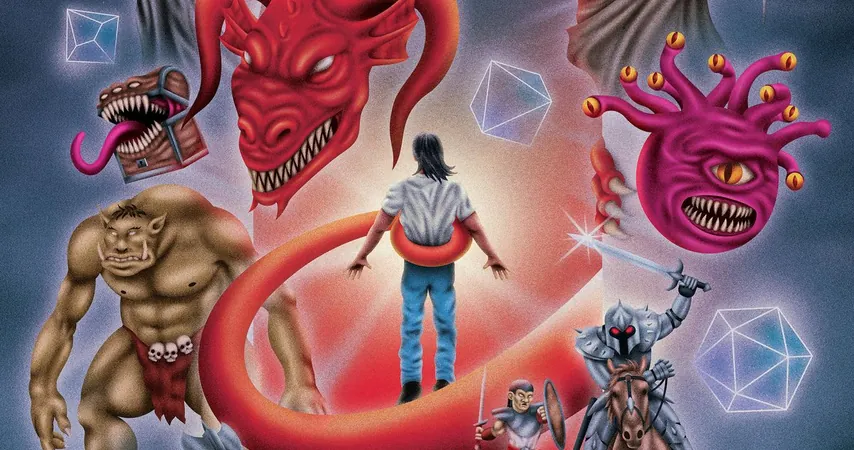
The Enduring Misunderstanding of Dungeons & Dragons: Why 50 Years Later, the Fascination Continues
2024-12-30
Author: Sarah
A Controversial Beginning
In 1979, the disappearance of 16-year-old James Dallas Egbert III from Michigan State University sent shockwaves through America. The media described his unsettling case, focusing on his affinity for a peculiar game that allowed players to embody fantastical heroes. This game was none other than Dungeons & Dragons (D&D), released by the obscure company Tactical Studies Rules (TSR). However, upon investigation, it became clear that Egbert’s issues were far more complex and rooted in personal trauma rather than a mere game. Tragically, he took his own life a year later, despite the game’s imaginative allure creating panic and misunderstanding among the public. D&D was, at the time, wrongly associated with themes of cult behavior and devil worship, prompting a widespread fear campaign, especially from religious groups who deemed it dangerous.
A Celebrated Milestone
Fast forward to 2023, and Dungeons & Dragons celebrates its monumental 50th anniversary, boasting an estimated 50 million players worldwide. This beloved game has remarkably evolved, attracting a diverse audience, including nearly 40% women and a vibrant queer community. The waves of influence that D&D has carried into the broader realm of gaming are undeniable, inspiring modern mechanics such as hit points and character progression that permeate the gaming landscape. Many credit the pandemic as a catalyst for its resurgence, with players flocking to online platforms to engage in epic campaigns while stuck at home, embracing everything from mind flayers to gelatinous cubes.
Enduring Misconceptions
Despite its rise in popularity, D&D continues to grapple with its conceptual ties to reality. During the notorious satanic panic of the 1980s, game officials attempted to present it as a harmless pastime, akin to reading fiction, yet its structure—an open-ended narrative reliant on player agency—brings about a unique form of engagement that can sometimes blur the line between amusement and obsession.
Psychological Perspectives
Critics have long speculated about the psychological implications of immersive role-playing. The game’s characteristic ability to draw players deeply into its world often leads to varying degrees of escapism. Sociologist Gary Alan Fine noted this within the D&D community’s self-awareness about its intimate relationship with reality and fantasy. Unlike traditional novels with fixed plots and endings, D&D campaigns can extend indefinitely, allowing players to create their own narratives which can feel both rewarding and unnerving.
Literary Connections
The connection between fantasy literature and D&D is rich and layered. Fantasy enthusiasts had already begun to engage with imaginative worlds in literature, tracing roots back to works like Cervantes' *Don Quixote*, which examined the gravitational pull of fictional realms. As the modern fantasy genre emerged throughout the 20th century—with the likes of J.R.R. Tolkien and Robert E. Howard shaping public tastes—Dungeons & Dragons drew directly from their creations to build a collaborative storytelling platform, albeit filled with its own inherent absurdities.
The Game's Unique Structure
What makes D&D distinct is its blend of calculation, narrative, and creativity; players assume characters endowed with extraordinary abilities and navigate through worlds crafted not by rigid speculations, but rather by collective imagination and improvisation. This dynamic not only fosters camaraderie but introduces an exhilarating unpredictability, making each session an organic demonstration of creativity.
Emotional Bonds and Nostalgia
Nevertheless, there lies a bittersweet aspect to D&D. Sessions, commonly requiring four hours or longer, often mean players have to navigate scheduling conflicts, leading to a lingering nostalgia for the fabricated worlds they escape to. The game’s structure requires effort and intention to conjure these realms continuously, creating an emotional bond and a shared history among players that is often difficult to let go of.
A Celebration of Humanity
Though some view this attachment with skepticism, with concerns of over-immersion, D&D can also be seen as a celebration of the human condition. Imaginative storytelling allows players to explore identities, confront fears, and fulfill desires in a shared space that thrives on collaboration and creativity.
An Ongoing Legacy
The unique interplay of fantasy, nostalgia, and the need for human connection embedded in Dungeons & Dragons continues to forge a lasting legacy. As more people discover—and rediscover—the joys and complexities of this game, society must reconcile its understanding of D&D, transforming outdated misconceptions into a recognition of its role in modern culture.
Crafting Shared Narratives
So, as players embark on their quests for the next dungeon delve, they are not just playing a game—they are crafting a shared narrative that spans generations, proving that the magic of imagination and storytelling will always have a place within the tapestry of human experience. After all, isn’t that the true power of Dungeons & Dragons?

 Brasil (PT)
Brasil (PT)
 Canada (EN)
Canada (EN)
 Chile (ES)
Chile (ES)
 Česko (CS)
Česko (CS)
 대한민국 (KO)
대한민국 (KO)
 España (ES)
España (ES)
 France (FR)
France (FR)
 Hong Kong (EN)
Hong Kong (EN)
 Italia (IT)
Italia (IT)
 日本 (JA)
日本 (JA)
 Magyarország (HU)
Magyarország (HU)
 Norge (NO)
Norge (NO)
 Polska (PL)
Polska (PL)
 Schweiz (DE)
Schweiz (DE)
 Singapore (EN)
Singapore (EN)
 Sverige (SV)
Sverige (SV)
 Suomi (FI)
Suomi (FI)
 Türkiye (TR)
Türkiye (TR)
 الإمارات العربية المتحدة (AR)
الإمارات العربية المتحدة (AR)